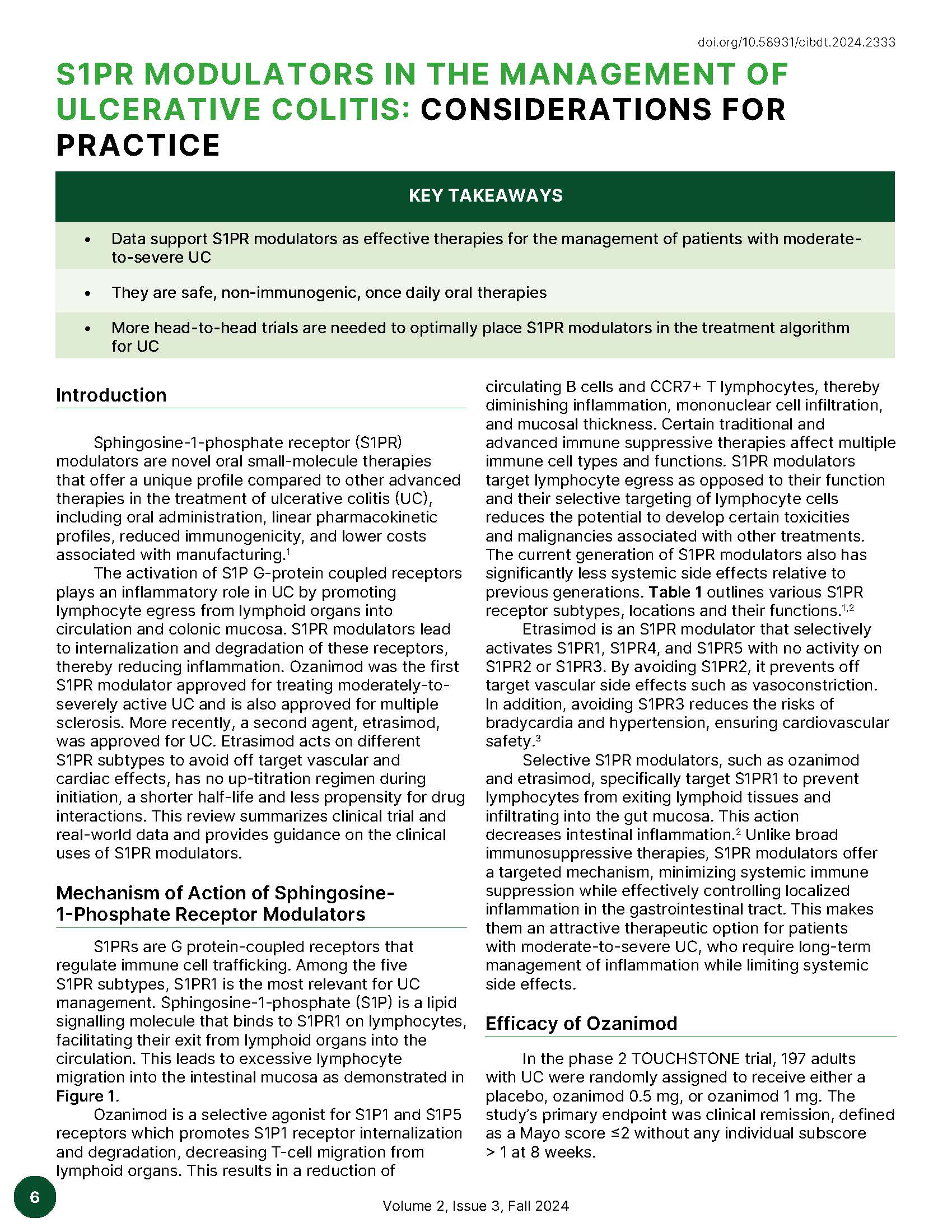S1PR Modulators in the Management of Ulcerative Colitis: Considerations for Practice
DOI:
https://doi.org/10.58931/cibdt.2024.2333Abstract
Sphingosine-1-phosphate receptor (S1PR) modulators are novel oral small-molecule therapies that offer a unique profile compared to other advanced therapies in the treatment of ulcerative colitis (UC), including oral administration, linear pharmacokinetic profiles, reduced immunogenicity, and lower costs associated with manufacturing.
The activation of S1P G-protein coupled receptors plays an inflammatory role in UC by promoting lymphocyte egress from lymphoid organs into circulation and colonic mucosa. S1PR modulators lead to internalization and degradation of these receptors, thereby reducing inflammation. Ozanimod was the first S1PR modulator approved for treating moderately-to-severely active UC and is also approved for multiple sclerosis. More recently, a second agent, etrasimod, was approved for UC. Etrasimod acts on different S1PR subtypes to avoid off target vascular and cardiac effects, has no up-titration regimen during initiation, a shorter half-life and less propensity for drug interactions. This review summarizes clinical trial and real-world data and provides guidance on the clinical uses of S1PR modulators.
References
Tourkochristou E, Mouzaki A, Triantos C. Unveiling the biological role of sphingosine-1-phosphate receptor modulators in inflammatory bowel diseases. World J Gastroenterol. 2023;29(1):110-125. doi:10.3748/wjg.v29.i1.110 DOI: https://doi.org/10.3748/wjg.v29.i1.110
Scott FL, Clemons B, Brooks J, Brahmachary E, Powell R, Dedman H, et al. Ozanimod (RPC1063) is a potent sphingosine-1-phosphate receptor-1 (S1P1 ) and receptor-5 (S1P5 ) agonist with autoimmune disease-modifying activity. Br J Pharmacol. 2016;173(11):1778-1792. doi:10.1111/bph.13476 DOI: https://doi.org/10.1111/bph.13476
SandbornWJ, Feagan BG, D'Haens G. Safety and efficacy of etrasimod in ulcerative colitis: a randomized trial. N Engl J Med. 2016;374(23):2225-2236.
Choden T, Cohen NA, Rubin DT. Sphingosine-1 phosphate receptor modulators: the next wave of oral therapies in inflammatory bowel disease. Gastroenterol Hepatol (N Y). 2022;18(5):265-271.
Sandborn WJ, Feagan BG, Wolf DC, D'Haens G, Vermeire S, Hanauer SB, et al. Ozanimod induction and maintenance treatment for ulcerative colitis. N Engl J Med. 2016;374(18):1754-1762. doi:10.1056/NEJMoa1513248 DOI: https://doi.org/10.1056/NEJMoa1513248
Sandborn WJ, Feagan BG, D'Haens G, Wolf DC, Jovanovic I, Hanauer SB, et al. Ozanimod as induction and maintenance therapy for ulcerative colitis. N Engl J Med. 2021;385(14):1280-1291. doi:10.1056/NEJMoa2033617 DOI: https://doi.org/10.1056/NEJMoa2033617
Yarur AJ, Chiorean MV, Panés J, Jairath V, Zhang J, Rabbat CJ, et al. Achievement of clinical, endoscopic, and histological outcomes in patients with ulcerative colitis treated with etrasimod, and association with faecal calprotectin and c-reactive protein: results from the Phase 2 OASIS trial. J Crohns Colitis. 2024;18(6):885-894. doi:10.1093/ecco-jcc/jjae007 DOI: https://doi.org/10.1093/ecco-jcc/jjae007
Vermeire S, Chiorean M, Panés J, Peyrin-Biroulet L, Zhang J, Sands BE, et al. Long-term safety and efficacy of etrasimod for ulcerative colitis: results from the open-label extension of the OASIS study. J Crohns Colitis. 2021;15(6):950-959. doi:10.1093/ecco-jcc/jjab016 DOI: https://doi.org/10.1093/ecco-jcc/jjab016
Sandborn WJ, Vermeire S, Peyrin-Biroulet L, Dubinsky MC, Panes J, Yarur A, et al. Etrasimod as induction and maintenance therapy for ulcerative colitis (ELEVATE): two randomised, double-blind, placebo-controlled, phase 3 studies. [published correction appears in Lancet. 2023 Mar 25;401(10381):1000. doi: 10.1016/S0140-6736(23)00586-X]. Lancet. 2023;401(10383):1159-1171. doi:10.1016/S0140-6736(23)00061-2 DOI: https://doi.org/10.1016/S0140-6736(23)00061-2
Atreya R, Neurath MF. The sphingosine-1-phosphate receptor agonist etrasimod in ulcerative colitis. Lancet. 2023;401(10383):1132-1133. doi:10.1016/s0140-6736(23)00228-3 DOI: https://doi.org/10.1016/S0140-6736(23)00228-3
Harris S, Feagan BG, Hanauer S, Vermeire S, Ghosh S, Yan J, et al. Ozanimod differentially impacts circulating lymphocyte subsets in patients with moderately to severely active crohn's disease. Dig Dis Sci. 2024;69(6):2044-2054. doi:10.1007/s10620-024-08391-z DOI: https://doi.org/10.1007/s10620-024-08391-z
Danese S, Panaccione R, Abreu MT, Rubin DT, Ghosh S, Dignass A, et al. Efficacy and safety of approximately 3 years of continuous ozanimod in moderately to severely active ulcerative colitis: interim analysis of the True North open-label extension. J Crohns Colitis. 2024;18(2):264-274. doi:10.1093/ecco-jcc/jjad146 DOI: https://doi.org/10.1093/ecco-jcc/jjad146
Sandborn WJ, Feagan BG, Hanauer S, Vermeire S, Ghosh S, Liu WJ, et al. Long-Term efficacy and safety of ozanimod in moderately to severely active ulcerative colitis: results from the open-label extension of the Randomized, Phase 2 TOUCHSTONE study. J Crohns Colitis. 2021;15(7):1120-1129. doi:10.1093/ecco-jcc/jjab012 DOI: https://doi.org/10.1093/ecco-jcc/jjab012
Vieujean S, Peyrin-Biroulet L. Pharmacokinetics of S1P receptor modulators in the treatment of ulcerative colitis. Expert Opin Drug Metab Toxicol. 2024;20(9):881-892. doi:10.1080/17425255.2024.2402931 DOI: https://doi.org/10.1080/17425255.2024.2402931
Sands BE, Schreiber S, Blumenstein I, Chiorean MV, Ungaro RC, Rubin DT. Clinician's guide to using ozanimod for the treatment of ulcerative colitis. J Crohns Colitis. 2023;17(12):2012-2025. doi:10.1093/ecco-jcc/jjad112 DOI: https://doi.org/10.1093/ecco-jcc/jjad112
Ytterberg SR, Bhatt DL, Mikuls TR, Koch GG, Fleischmann R, Rivas JL, et al. Cardiovascular and cancer risk with tofacitinib in rheumatoid arthritis. N Engl J Med. 2022;386(4):316-326. doi:10.1056/NEJMoa2109927 DOI: https://doi.org/10.1056/NEJMoa2109927
Peyrin-Biroulet L, Dubinsky MC, Sands BE, Panés J, Schreiber S, Reinisch W, et al. Efficacy and safety of etrasimod in patients with moderately to severely active isolated proctitis: results from the Phase 3 ELEVATE UC Clinical Programme. [published correction appears in J Crohns Colitis. 2024 Aug 14;18(8):1356. doi: 10.1093/ecco-jcc/jjae098]. J Crohns Colitis. 2024;18(8):1270-1282. doi:10.1093/ecco-jcc/jjae038 DOI: https://doi.org/10.1093/ecco-jcc/jjae038
Lasa JS, Olivera PA, Danese S, Peyrin-Biroulet L. Efficacy and safety of biologics and small molecule drugs for patients with moderate-to-severe ulcerative colitis: a systematic review and network meta-analysis. Lancet Gastroenterol Hepatol. 2022;7(2):161-170. doi:10.1016/s2468-1253(21)00377-0 DOI: https://doi.org/10.1016/S2468-1253(21)00377-0
Solitano V, Vuyyuru SK, MacDonald JK, Zayadi A, Parker CE, Narula N, et al. Efficacy and safety of advanced oral small molecules for inflammatory bowel disease: systematic review and meta-analysis. J Crohns Colitis. 2023;17(11):1800-1816. doi:10.1093/ecco-jcc/jjad100 DOI: https://doi.org/10.1093/ecco-jcc/jjad100
Battat R, Chang JT, Loftus EV, Jr., Sands BE. IBD matchmaking - rational combination therapy. Clin Gastroenterol Hepatol. 2024. doi:10.1016/j.cgh.2024.05.051 DOI: https://doi.org/10.1016/j.cgh.2024.05.051

Published
How to Cite
Issue
Section
License
Copyright (c) 2024 Canadian IBD Today

This work is licensed under a Creative Commons Attribution-NonCommercial-NoDerivatives 4.0 International License.
